The Varicella Zoster Infection Treatment Market is estimated to be valued at USD 1.8 billion in 2025 and is projected to reach USD 2.7 billion by 2035, registering a compound annual growth rate (CAGR) of 4.1% over the forecast period.
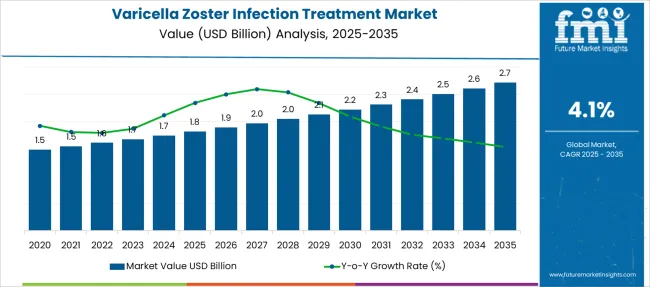
| Metric | Value |
|---|---|
| Varicella Zoster Infection Treatment Market Estimated Value in (2025 E) | USD 1.8 billion |
| Varicella Zoster Infection Treatment Market Forecast Value in (2035 F) | USD 2.7 billion |
| Forecast CAGR (2025 to 2035) | 4.1% |
The varicella zoster infection treatment market is witnessing steady expansion, fueled by growing prevalence of herpes zoster among aging populations and increased awareness of post-herpetic neuralgia complications. Advancements in antiviral therapies, early diagnosis through point-of-care testing, and supportive reimbursement frameworks have improved treatment uptake across both developed and developing economies.
Pharmaceutical innovation targeting viral suppression and pain management has driven clinical preference toward combination regimens with enhanced bioavailability and tolerability. Government immunization programs and expanded access to vaccines have complemented therapeutic approaches, yet breakthrough infections continue to support demand for pharmacological intervention.
As healthcare systems strengthen post-acute care and outpatient delivery models, the market is expected to evolve further with oral formulations and targeted antivirals gaining traction.
The market is segmented by Drug Type, Route of Administration, and Distribution Channel and region. By Drug Type, the market is divided into Acyclovir, Valacyclovir, and Famciclovir. In terms of Route of Administration, the market is classified into Oral, Injectable, and Topical. Based on Distribution Channel, the market is segmented into Hospital pharmacies, Retail Pharmacies, Online Pharmacies, and Drug Stores. Regionally, the market is classified into North America, Latin America, Western Europe, Eastern Europe, Balkan & Baltic Countries, Russia & Belarus, Central Asia, East Asia, South Asia & Pacific, and the Middle East & Africa.
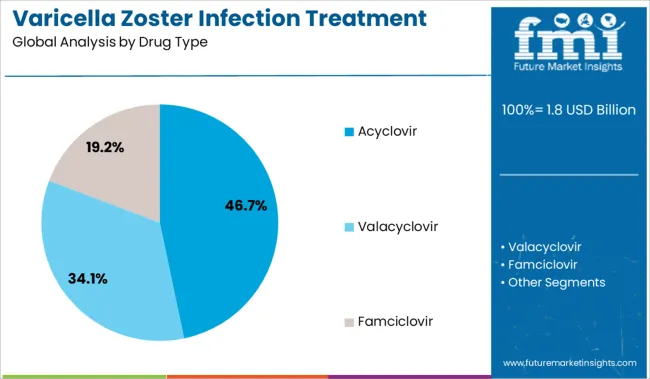
Acyclovir is projected to account for 46.70% of the total revenue in the varicella zoster infection treatment market by 2025, positioning it as the leading drug type. This leadership is being driven by its well-established clinical efficacy, affordability, and broad usage across acute and recurrent infections.
Acyclovir's favorable safety profile and widespread availability in both branded and generic forms have solidified its role as a first-line agent. Continued physician familiarity and dosing flexibility for different patient demographics have further reinforced its dominance.
The drug’s proven track record in reducing viral shedding and post-herpetic neuralgia risk continues to support its adoption, particularly in hospital and long-term care settings where treatment initiation speed is critical.
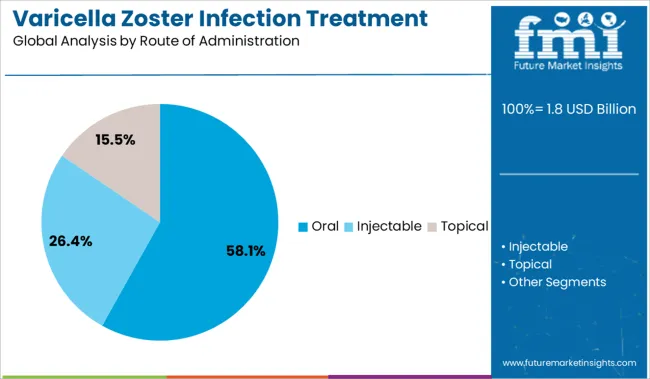
The oral route is expected to hold 58.10% of the total market revenue in 2025, making it the most preferred route of administration. This preference is being shaped by ease of self-administration, improved patient compliance, and broad prescribing comfort across clinical environments.
Oral antivirals enable outpatient management, reducing hospitalization burden while maintaining therapeutic efficacy in both immunocompetent and immunocompromised populations. Technological advancements in oral drug delivery systems, including extended-release and enhanced absorption formulations, are further enhancing patient outcomes.
The scalability of oral treatments in pandemic-affected and rural healthcare environments has solidified their role in frontline therapy. Cost-effectiveness and minimal need for clinical supervision have made the oral route ideal for early intervention and post-exposure management.
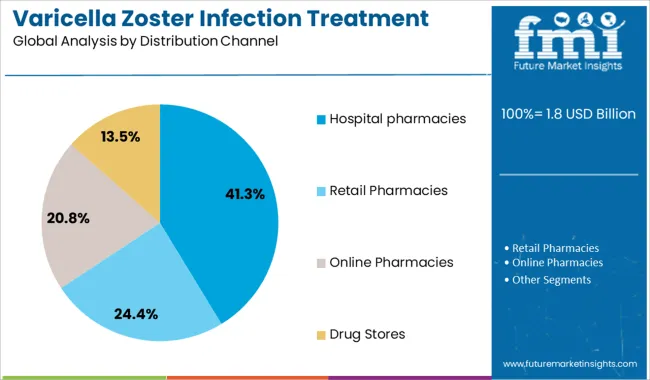
Hospital pharmacies are projected to contribute 41.30% of total market revenue in 2025, emerging as the leading distribution channel. Their dominance is attributed to high patient volumes, immediate access to acute care medications, and centralized formulary management practices.
Hospital settings remain the primary point of care for severe varicella zoster manifestations, particularly among elderly or immunocompromised individuals. The availability of multiple antiviral classes, supportive medications, and diagnostic services in a single ecosystem supports continuity of care.
In addition, strong purchasing power and procurement efficiency in institutional settings have driven consistent demand. Pharmacovigilance and medication stewardship programs within hospitals also ensure optimal dosing and minimize resistance risks, further reinforcing the channel’s importance in the therapeutic value chain.
| Particulars | Details |
|---|---|
| H1, 2024 | 4.17% |
| H1, 2025 Projected | 4.11% |
| H1, 2025 Outlook | 4.01% |
| BPS Change - H1, 2025 (O) - H1, 2025 (P) | (-) 10 ↓ |
| BPS Change - H1, 2025 (O) - H1, 2024 | (-) 16 ↓ |
A comparative analysis about the market growth rates and development prospects in the global varicella zoster infection treatment market have been mapped by Future Market Insights. According to the FMI analysis, compared to H1-2024, the market is expected to decline by 16 Basis Point Share (BPS) in H1 2025 (O).
Major reasons for this dip in BPS are attributed to the adverse effects of antiviral therapy which include neurological, gastrointestinal stent, and renal toxicity. The market further observes a decline in 10 BPS in H1-2025 outlook as compared to H1-2025 projected period.
The market is subject to be influenced by regulatory guidelines and medical device approvals in accordance with impact of macro, economic, and industry factors. Prevention of varicella zoster infection through vaccination strategies permits the avoidance of primary infections in neonates and vulnerable cases. These are some of the significant breakthroughs in the varicella zoster infection treatment market.
Other market segments are correspondingly set to perform objectively and attain promising growth prospects in the next half of projection period. Additionally, there are some factors which positively drive the industry growth, including the improvement of cell medicated immunity after second administration of varicella vaccine, and long-lasting immunity response of live attenuated vaccines.
The Global varicella zoster infection treatment market is expected to grow at a modest rate during the forecast period. The epidemiology of the varicella infection is higher in children aged 4 to 10 year. However, Herpes zoster occur due to reactivation of varicella zoster virus in older age, where, the incidence is higher in older age population >60 years compared to adults and children.
For instance, in 2024, United States (US) reported that the risk of Herpes Zoster increases with age. A cumulative incidence of Herpes Zoster were reported to be from 2.9–19.5 cases per 1,000 population and an incidence rate of Herpes Zoster ranging from 5.23–10.9 cases per 1,000 person-years. It is been expected that the incidence of herpes zoster in these countries will increase with increasing older age population.
The Global Varicella Zoster Infection Treatment market constitutes nearly 3% of the ~1.7 Billion Antiviral Drugs Market, globally in 2024. Herpes zoster is not common in children younger than 1 year and is rarely found in children’ younger than 1 year. However, if a pregnant female witness’s varicella zoster infection during pregnancy, there are high chances of the fetus developing asymptomatic congenital infections. Such children generally present herpes zoster within the first year of their life. Furthermore, the growing risk of prenatal varicella zoster leads to the uptake of antiviral drugs treatment later in pregnancy. Thus, the growing risk of postnatal varicella zoster infection in children younger than 1 year of age and the subsequent use of acyclovir as the first line of treatment for these infected children will drive the growth of varicella zoster infection treatment market in future.
Hence, the demand outlook for varicella zoster infection treatment market is expected to grow rapidly during the forecast period from 2025 to 2035 owing to the growing demand for effective drug treatments for varicella zoster infections.
The market is expected to expand at a considerable growth rate for the period 2025 to 2035 at a CAGR of approximately 4.1%, and observe an incremental D opportunity of USD 1.8 Million from 2025 to 2035. Demand for Acyclovir drug as a first line treatment will remain the maximum throughout the forecast period.
The increasing incidences of viral borne disease among children and old population, high transmission rate of the infection, high occurrence of infections in low or middle-income countries and growing revenue of the market players are the major factors contributing to the growth of the varicella zoster infection treatment market.
The companies in the varicella zoster infection treatment market are focusing on organic and inorganic growth by launching their products and to gain maximum market share. Moreover, acquisitions, expansion of product portfolio and research & development capabilities are expected to create opportunities for the growth of the market.
The adverse effect of anti-viral therapy treatment among the elderly population presents a biggest challenge for the market to grow ahead, the elderly care itself is an intensive care segment and onset of viral diseases like Herpes Zoster increases the risk of associated infections and other reactions.
Moreover, availability of other treatment options for treating the herpes zoster and varicella such as homeopathy, supplements and other natural herbal medicines may also come out as a bigger challenge for the varicella zoster infection treatment market. A clinical study done in China also revealed that the modified Gentiana formula when combined with the topical cream as a treatment for post-herpetic neuralgia, was more effective than the antiviral drugs treatment. Additionally, introduction of generic drugs by the local players in large number together with rising cases of product recalls of many such drugs are leading to create quality concern of these generic drugs amongst the consumers. All such factors together may pose greater challenges for the varicella zoster infection treatment market growth during the forecast period.
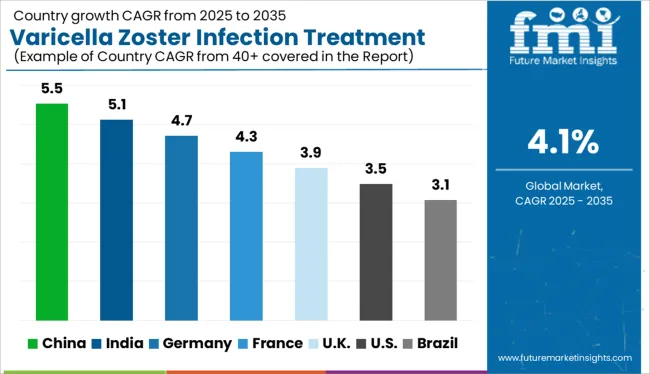
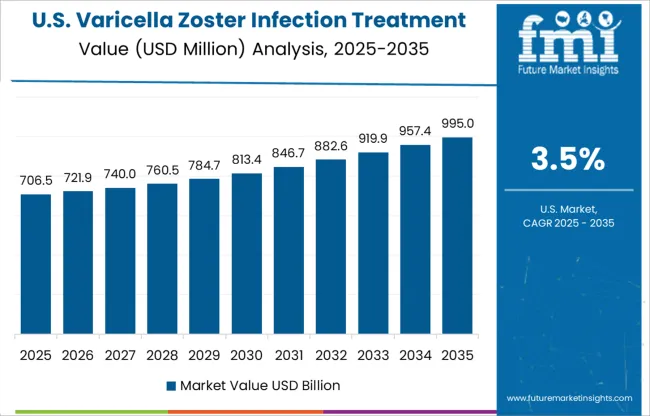
The USA is the leading country of the North American region with a total market value share of 90.3% in 2024 and is projected to continue commanding the high growth during the coming years from 2025 to 2035. The deep incidence of herpes infection among children mainly drives the growth of this market & their humanization and increasing pets disorder owing to rise in disease incidence.
For instance, as per Centre for Diseases Prevention and Control, an estimated one million cases of herpes zoster occur annually in the United States. The incidence for herpes zoster is approximately 4 cases per 1,000 USA population annually.
Additionally, presence of major players involved in the commercialization and development of herpes zoster interventions is also one of the major factor for the growth of this market in this region.
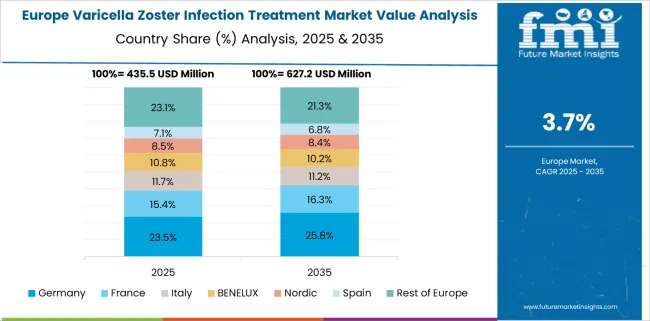
Germany dominates the Western Europe market of varicella zoster, with a share of nearly 24.7% of the market share by value in 2024. Similar growth is expected throughout the forecast period owing to the higher prevalence of herpes and increasing research and development activities which is also contributing to the varicella zoster infection treatment market growth in the region.
For instance, the incidence of HZ in Germany ranges from about 1/1,000 in children aged less than 10 years, to more than 10/1,000 in persons aged 80 years and older; the incidence becomes distinctly higher in persons from 50 years onwards.
In 2024, Japan holds around 6.9% share in the global market by value and is been estimated to expand at a CAGR of 2.7% during the forecast period. The rising incidence of Herpes Zoster in the general population aged ≥ 50 or ≥ 60 years in the country leads to enhance the demand of varicella zoster infection treatment.
Additionally, rising government funding and support for vaccination and awareness campaigns are expected to propel the varicella zoster infection treatment market forward throughout the projection period.
In 2024, China has considerable share by value in the global market ranging around 8.7% and is been projected to expand at a CAGR of 4.5% from 2025 to 2035. This is predominantly due to the increasing risk of herpes zoster among the elderly population. Approximately, 32% of the Chinese population is aged 50 years and older and this proportion is increasing. Because of the ageing population, the public burden associated with shingles is been expected to increase over the time.
By product, acyclovir drug accounts for the highest share of around 55.9% in 2024 and expected to expand at a CAGR of 3.7% during the forecast period from 2025 to 2035.
Acyclovir presents the broader scope for the treatment of herpes zoster. It is also used to treat repeat outbreaks to prevent further outbreaks of genital herpes (a herpes virus infection that causes sores to form around the genitals and rectum from time to time) in people with a normal immune system. Famciclovir is also used to treat returning herpes simplex infections of the skin and mucus membranes (mouth, anus) in people with human immunodeficiency virus (HIV) infection
Owing to its broader benefits, the varicella zoster infection treatment market is experiencing its faster adoption, resulting in driving the demand for the drug in the varicella zoster infection treatment during the forecast period from 2025 to 2035.
The Oral route for drug administration dominates the varicella zoster infection treatment market, with a 64.3% of the revenue share in 2024. This trend is expected to continue to grow during the study period. The high share of this segment is been attributed to its inherited safety, higher absorption and increased usage in the procedures and related treatment.
Based on the distribution channel, hospital pharmacies is the leading segment, with 43% market share in 2024 and expanding at a CAGR of 3.9% in the forecast period. Growing number of herpes zoster treatments in the hospitals and availability of medicines in the hospital pharmacies, as these medicines can only be bought if prescribed by a doctor or medical practitioner, will provide lucrative opportunities for varicella zoster infection treatment market growth.
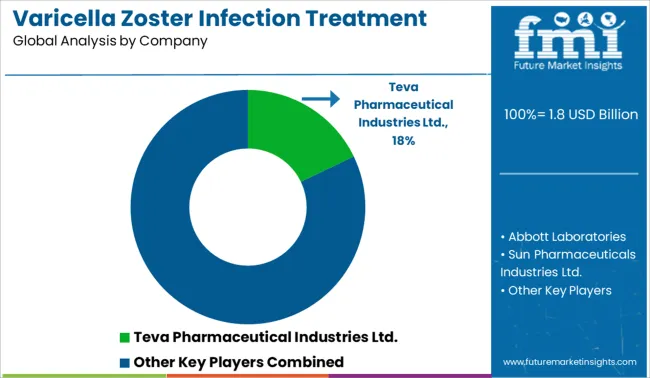
The key companies are focusing on regulatory approvals, new drug launches and marketing of their brands to get more attention and gain maximum market share. Additionally, acquisitions, mergers and strategic collaborations play a vital role in the growth of the varicella zoster infection treatment market.
In Dec 2020, Valeant Pharmaceuticals International, Inc. announced new fulfillment agreements with Walgreens. Due to these agreements, the company forayed into retail business pharmacies
| Attribute | Details |
|---|---|
| Forecast Period | 2025 to 2035 |
| Historical Data Available for | 2012 to 2024 |
| Market Analysis | USD Million for Value, Units for Volume |
| Key Countries Covered | USA, Canada, Brazil, Mexico, Argentina, Germany, UK, France, Italy, Spain, Benelux, Russia, China, Japan, India, ASEAN, Australia, New Zealand, and GCC Countries |
| Key Segments Covered | Drug Type, Route of Administration, Distribution Channel, and Region |
| Key Companies Profiled | Novartis AG; Pfizer Inc.; Abbott Laboratories; Sun Pharmaceuticals Industries Ltd.; Valeant Pharmaceuticals International Inc.; Teva Pharmaceutical Industries Ltd.; Dr. Reddy’s Laboratories, ltd.; Mylan N.V. and; GlaxoSmithKline |
| Report Coverage | Market Forecast, Competition Intelligence, DROT Analysis, Market Dynamics and Challenges, Strategic Growth Initiatives |
| Customization & Pricing | Available upon Request |
The global varicella zoster infection treatment market is estimated to be valued at USD 1.8 billion in 2025.
The market size for the varicella zoster infection treatment market is projected to reach USD 2.7 billion by 2035.
The varicella zoster infection treatment market is expected to grow at a 4.1% CAGR between 2025 and 2035.
The key product types in varicella zoster infection treatment market are acyclovir, valacyclovir and famciclovir.
In terms of route of administration, oral segment to command 58.1% share in the varicella zoster infection treatment market in 2025.






Full Research Suite comprises of:
Market outlook & trends analysis
Interviews & case studies
Strategic recommendations
Vendor profiles & capabilities analysis
5-year forecasts
8 regions and 60+ country-level data splits
Market segment data splits
12 months of continuous data updates
DELIVERED AS:
PDF EXCEL ONLINE
Varicella Vaccines Market Insights - Growth, Trends & Forecast 2024 to 2034
Herpes Zoster Ophthalmicus Market Size and Share Forecast Outlook 2025 to 2035
Treatment-Resistant Hypertension Management Market Size and Share Forecast Outlook 2025 to 2035
Treatment-Resistant Depression Treatment Market Size and Share Forecast Outlook 2025 to 2035
Treatment Pumps Market Insights Growth & Demand Forecast 2025 to 2035
Pretreatment Coatings Market Size and Share Forecast Outlook 2025 to 2035
Air Treatment Ozone Generator Market Size and Share Forecast Outlook 2025 to 2035
CNS Treatment and Therapy Market Insights - Trends & Growth Forecast 2025 to 2035
Seed Treatment Materials Market Size and Share Forecast Outlook 2025 to 2035
Acne Treatment Solutions Market Size and Share Forecast Outlook 2025 to 2035
Scar Treatment Market Overview - Growth & Demand Forecast 2025 to 2035
Soil Treatment Chemicals Market
Water Treatment System Market Size and Share Forecast Outlook 2025 to 2035
Water Treatment Chemical Market Size and Share Forecast Outlook 2025 to 2035
Algae Treatment Chemical Market Forecast and Outlook 2025 to 2035
Water Treatment Market Size and Share Forecast Outlook 2025 to 2035
Water Treatment Ozone Generator Market Size and Share Forecast Outlook 2025 to 2035
Water Treatment Equipment Market Size and Share Forecast Outlook 2025 to 2035
Burns Treatment Market Overview – Growth, Demand & Forecast 2025 to 2035
CRBSI Treatment Market Insights - Growth, Trends & Forecast 2025 to 2035

Thank you!
You will receive an email from our Business Development Manager. Please be sure to check your SPAM/JUNK folder too.
Chat With
MaRIA